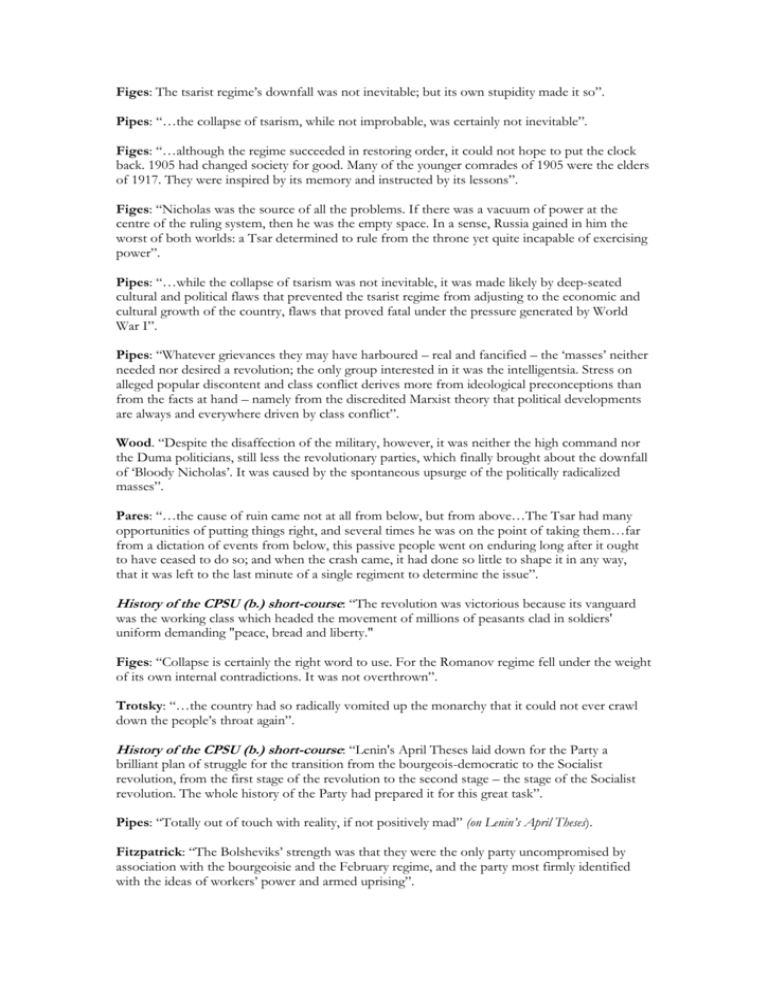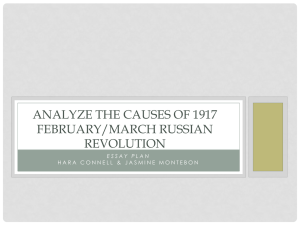Russian Revolution: Historical Quotes & Perspectives
advertisement

Figes: The tsarist regime’s downfall was not inevitable; but its own stupidity made it so”. Pipes: “…the collapse of tsarism, while not improbable, was certainly not inevitable”. Figes: “…although the regime succeeded in restoring order, it could not hope to put the clock back. 1905 had changed society for good. Many of the younger comrades of 1905 were the elders of 1917. They were inspired by its memory and instructed by its lessons”. Figes: “Nicholas was the source of all the problems. If there was a vacuum of power at the centre of the ruling system, then he was the empty space. In a sense, Russia gained in him the worst of both worlds: a Tsar determined to rule from the throne yet quite incapable of exercising power”. Pipes: “…while the collapse of tsarism was not inevitable, it was made likely by deep-seated cultural and political flaws that prevented the tsarist regime from adjusting to the economic and cultural growth of the country, flaws that proved fatal under the pressure generated by World War I”. Pipes: “Whatever grievances they may have harboured – real and fancified – the ‘masses’ neither needed nor desired a revolution; the only group interested in it was the intelligentsia. Stress on alleged popular discontent and class conflict derives more from ideological preconceptions than from the facts at hand – namely from the discredited Marxist theory that political developments are always and everywhere driven by class conflict”. Wood. “Despite the disaffection of the military, however, it was neither the high command nor the Duma politicians, still less the revolutionary parties, which finally brought about the downfall of ‘Bloody Nicholas’. It was caused by the spontaneous upsurge of the politically radicalized masses”. Pares: “…the cause of ruin came not at all from below, but from above…The Tsar had many opportunities of putting things right, and several times he was on the point of taking them…far from a dictation of events from below, this passive people went on enduring long after it ought to have ceased to do so; and when the crash came, it had done so little to shape it in any way, that it was left to the last minute of a single regiment to determine the issue”. History of the CPSU (b.) short-course: “The revolution was victorious because its vanguard was the working class which headed the movement of millions of peasants clad in soldiers' uniform demanding "peace, bread and liberty." Figes: “Collapse is certainly the right word to use. For the Romanov regime fell under the weight of its own internal contradictions. It was not overthrown”. Trotsky: “…the country had so radically vomited up the monarchy that it could not ever crawl down the people’s throat again”. History of the CPSU (b.) short-course: “Lenin's April Theses laid down for the Party a brilliant plan of struggle for the transition from the bourgeois-democratic to the Socialist revolution, from the first stage of the revolution to the second stage – the stage of the Socialist revolution. The whole history of the Party had prepared it for this great task”. Pipes: “Totally out of touch with reality, if not positively mad” (on Lenin’s April Theses). Fitzpatrick: “The Bolsheviks’ strength was that they were the only party uncompromised by association with the bourgeoisie and the February regime, and the party most firmly identified with the ideas of workers’ power and armed uprising”. Rosenberg: “Indeed, as imperial Russia’s state-capitalist structure did begin to crumble, at once cause and consequence of the deprivations of war and revolution, the analytic logic of class difference and conflict became the insidious, ideologized passions of class warfare”. Pipes: “The events that led to the overthrow of the Provisional Government were not spontaneous but carefully plotted and staged by a tightly organised conspiracy…October was a classic coup d’etat, the capture of governmental authority by a small band, carried out, in deference to the democratic professions of the age, with a show of mass participation, but with hardly any mass involvement”. Ulam: “The Bolsheviks did not seize power, they picked it up”. G.D. Obichkin: “In his guidance of the uprising, Lenin’s genius as a leader of the masses, a wise and fearless strategist, who clearly saw what direction the revolution would take, was strikingly revealed”. Pipes: “It was a surreptitious seizure of the nerve centres of the modern state, carried out under false slogans in order to neutralize the population at large, the true purpose of which was revealed only after the new claimants to power were firmly in the saddle”. History of the CPSU (b.) short-course: “The Petrograd workers in those days showed what a splendid schooling they had received under the guidance of the Bolshevik Party. The revolutionary units of the army, prepared for the uprising by the work of the Bolsheviks, carried out fighting orders with precision and fought side by side with the Red Guard. The navy did not lag behind the army. Kronstadt was a stronghold of the Bolshevik Party, and had long since refused to recognize the authority of the Provisional Government. The cruiser Aurora trained its guns on the Winter Palace, and on October 25 their thunder ushered in a new era, the era of the Great Socialist Revolution”. Pipes: “Communism thus did not come to Russia as a result of a popular uprising: it was imposed on her from above by a small minority hiding behind democratic slogans”. John Reed: “Instead of being a destructive force, it seems to me that the Bolsheviki were the only party in Russia with a constructive programme and the power to impose it on the country. If they had not succeeded the Government when they did, there is little doubt in my mind that the armies of imperial Germany would have been in Petrograd and Moscow in December, and Russia would again be ridden by a Tsar”. Pipes: “It is a mistake to attribute the February Revolution to fatigue with the war. The contrary is true. Russians wanted to pursue the war more effectively, and they felt that the existing government was not capable of doing it, that existing political structures were in need of a major overhaul...Fatigue with the war set in only after the unsuccessful June 1917 offensive launched by the Provisional Government to bolster its prestige and lift national morale.








